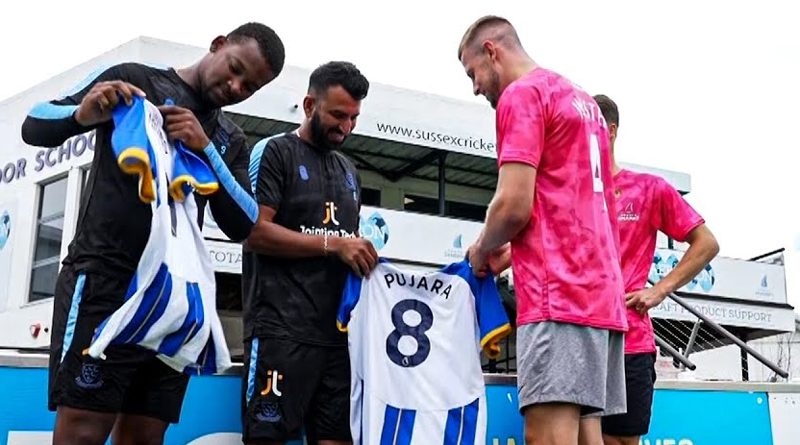What lessons should Sussex Cricket be learning from the Albion?
The end of the football season each May no doubt leaves many Brighton fans feeling bereft and counting down the days until the season starts all over again in August.
For others, however, it is a chance to focus on other sports. Many Sussex-based Albion fans will spend their summer watching tennis at Eastbourne or cricket at Hove.
Rarely do Sussex County Cricket Club and Brighton & Hove Albion have successful periods which coincide with each other.
Right now, Sussex are on a journey which seems to be almost diametrically opposite to the rise the Albion have experienced.
It was the other way round back during the 2000s. In 2003, Brighton were relegated back to the third tier whilst Sussex punched well above their weight in securing their first ever County Championship.
The Albion spent six of the next eight seasons in League One. Sussex in contrast won two more County Championships and four one-day trophies in just six seasons. They could justifiably claim to be the best team in the country.
Into the 2010s and Sussex did at least keep the flame burning brightly in T20 cricket, even if they could not convert that into further titles. Outside of T20, Sussex have otherwise never managed to repeat those halcyon days.
The most notorious setback came when overseas professional Lou Vincent accepted money as he conspired to deliberately lose the 2011 T20 quarter final against Lancashire
Brighton meanwhile have gone from strength to strength since 2011, climbing from League One to break into the Premier League top six and play Europa League football.
The differences in approach between Sussex and the Albion
The Sussex Cricket Twitter account proudly follows the Albion Twitter account. Sussex should extend this beyond social media, seeking to follow the way Brighton have built a successful team, environment and culture allowing them to punch well above their weight.
Take the use of data for example. The Albion use a world-renowned transfer model using statistics and algorithms. Sussex in contrast seem to have an allergy to data when it comes to team selection and recruitment.
In Roberto De Zerbi, Brighton have a head coach with an infectious personality. He wants to win every competition and entertain doing so.
Sussex head coach Paul Farbrace said in an interview last month he would make “no apologies” for prioritising the County Championship, followed by T20 and then 50-over cricket.
Many Sussex fans view the 50-over competition as the county’s best chance of winning a trophy. It appears as though Farbrace is going to treat it with the same disdain Graham Potter did the League Cup.
Whereas the inspirational De Zerbi has created a fantastic environment at the Amex where everyone is pulling in the same direction, indications are that Sussex is a place of fractured relationships and management style more in common with Jose Mourinho and Erik ten Haag.
November was a particularly depressing month for Sussex supporters. Young batsman Ali Orr – seen by many fans as a future England star and with significant box office appeal – moved down the road to rivals Hampshire.
It almost seemed as though Orr had been actively encouraged to look for other opportunities, the equivalent of De Zerbi and the Albion allowing Evan Ferguson to move with little or no resistance.
For Sussex icons Chris Adams and Ian Gould, this was the last straw. They resigned from the Sussex committee. Adams surely spoke for almost all fans when he described the decision to allow Orr to depart as “reckless at best and unforgivable at worst.”
Former Sussex captain Alan Wells meanwhile said he was: “Totally bemused by how Sussex have managed to let go one of the best young cricketers that has played for Sussex in the past several years.”
Players who have obtained legendary status publicly criticising their former club is never a good look and thankfully one rarely, if ever, seen at the Albion.
How did Sussex reach such a depressing low?
Go back to the end of the 2022 cricket season and Sussex fans were left with considerable optimism, even though only Leicestershire finished below them in the County Championship.
The arrivals of Brad Currie and Ari Karvelas helped deliver an exciting 50-over campaign as their bowling backed up thrilling batting displays led by Orr and captain Cheteshwar Pujara.
Orr, Tymal Mills, George Garton and Delray Rawlins looked set to provide the nucleus for T20 success in 2023. Hopes were high over what Sussex could achieve in the County Championship too.
Currie, Karvelas and the emergence of James Coles and Jack Carson gave legitimate hopes of a push for promotion into Division One.
Off the field, the club looked to have played a strong hand with the housing development above the Sussex Cricketer pub promising financial security for many years to come.
A number of Sussex schools now have very strong cricket programmes developing players like Orr, Oli Carter, Archie Lenham and Dan Ibrahim.
Sussex also struck up a partnership with minor counties Oxfordshire, bringing them Coles (another who looks likely to play for England in the future), Harrison Ward and Zach Lion-Cachet to Hove.
The strong youth development programme was reminiscent of the Albion, whilst the link with Oxfordshire could be seen in the same light Brighton and Union Saint-Gilloise.
Even the turmoil of joint head coach Ian Salisbury leaving the county looked like it would work out for the best. In convincing Farbrace to come to Hove, Sussex pulled off quite the coup.
Here was a coach who had been assistant for England when they won the World Cup in 2019. More recently, he helped Warwickshire to the County Championship title as director of cricket.
Farbrace appeared to be the sort of upgrade Tony Bloom and Brighton managed when replacing Potter with De Zerbi in October 2022, an unexpected opportunity to make a new appointment but one the respective decision makers got right.
Yet after the disappointing 2023 season Sussex endured, many fans were left wondering if Warwickshire’s success was more down to the coaching role fulfilled by ex-Sussex coach Mark Robinson.
What went wrong for Sussex in 2023?
Player availability for Sussex in the 2023 season was almost as bad as Brighton have suffered in recent months. Take Ollie Robinson for example.
With 37 wickets at 14.5 in just six matches over the last two seasons, his presence takes Sussex to a different level. Robinson though is injury prone and on a central contract, meaning the English Cricket Board pay his wages and dictate when he plays for Sussex to the benefit of the the national team.
It is therefore unlikely Robinson will feature more regularly for Sussex in 2024. Imagine Gareth Southgate telling De Zerbi he is not allowed to play Lewis Dunk for Brighton!
Sussex’s T20 campaign was partly derailed by an early injury to Orr, Garton’s limited appearances and Rawlins going back to Bermuda.
The relationship between Farbrace and Garton and Rawlins may have impacted their availability, although fans know little of the background of that situation.
Losing Rawlins’ combination of bowling ability up the hill at Hove, powerful batting and exceptional fielding was a particular blow. His all-around talent made his departure akin to Brighton seeing Pascal Gross head home to Germany.
Other injuries also impacted on Sussex – but the county only had themselves to blame for the end of season trauma in the County Championship which saw 12 points deducted.
Though bad luck contributed to some of the above issues, there were plenty of questions to be asked about player selection, recruitment and on-field decisions when it came to the toss, bowling and batting.
In all the years I have watched cricket, I cannot remember ever being more bemused by playing decision making. There were audible gasps of surprise in the stands at Hove on more than one occasion wen decisions at the toss were announced.
The use of bowlers was equally baffling. Fynn Hudson-Prentice has an economy rate of 10 in T20 cricket. Opponents particularly target him at the end of the powerplay, so why is he continually bowled then?
Nor could much sense be made of the batting order at time. When more than 10 an over are needed, why introduce a player who finds it harder to hit boundaries ahead of Garton or Nathan McAndrew?
Every selection decision De Zerbi makes can be explained with sound reasoning, even if to fans they can initially appear a little strange.
Gross at right back was met with more than a few questions when De Zerbi first tried it. Now, it feels like the German has been playing there his whole Albion career.
With Sussex, it often appears as though they are just making it up as they go along. There is no logic or plan; the total opposite to the Albion.
Selection, recruitment and no Moneyball
Sussex actually made a promising start in the 2023 County Championship, only for hopes of promotion to derail with a series of draws during May.
Again, without knowing any of the background, the recruitment of Steve Smith for three games looks as absurd now as it did at the time.
It had an obvious detrimental impact on Sussex’s promotion chances, before you even get into the valid criticism the county faced for helping the Australian vice-captain adjust to English conditions ahead of an Ashes series.
Australian state sides in contrast are not allowed to give equivalent short-term contracts and match practice to England players before the Ashes down under.
This is not to decry Smith’s obvious ability as one of the best batsmen in the world – and Sussex will insist his stay gave a positive benefit to the young players at the club.
However, it was obvious that Sussex had little need of an additional batsman. It was instead clear that their bowling line up needed strengthening and more support given to the Australian McAndrew, who was making a significant impact in the absence of Robinson.
With Pujara captaining the side, only one other overseas player was permitted. Sussex opted to omit one of their best bowlers McAndrew in favour of playing Smith.
This proved to be a maddening decision. Smith did not score many runs in matches where a couple of additional wickets from McAndrew would have converted two five-point draws into 16-point wins Sussex desperately needed.
Even a modicum of data-led selection would have told Sussex that McAndrew was more valuable to their chances of success than Smith.
The county instead seemed blinded by Smith’s reputation – the complete opposite of the ethos of Bloom and the Albion.
Smith was not the only piece of recruitment that made little sense. One area Sussex appeared comparatively well catered for was wicket-keeper batsmen.
22-year-old Carter recorded a first-class average in 2023 of 36 and strong strike rates (104 at 50 overs, 136 at T20). His keeping was also much improved between the 2022 and 2023 seasons, something he had clearly worked on in the winter.
Farbrace stated that there was little to choose between Carter promising 19-year-old Charlie Tear. Sussex also had the option of using Tom Alsop as wicket-keeper in one-day cricket.
With three good players capable of wicket-keeping, what sense did it make to spend limited funds on the temporary signing of 29-year-old Michael Burgess for T20? Burgess possesses a strike rate of 119 compared to Carter’s 136.
Looking ahead to 2024, Sussex have made a further nonsensical decision by using those limited funds on signing 35-year-old wicket-keeper John Simpson from Middlesex.
Simpson has a first-class average of 33 and a significantly lower strike rate than Carter in both one-day formats. His arrival just blocks the development of Carter and Tear, both of whom are improving.
Carter already looks to be a better batsman than Simpson and on 2023 form, there does not appear to be a significant differential with keeping.
Cricket is by nature a more individualist sport than cricket. This means that statistics are more readily available for batting, bowling and fielding than in football.
The Moneyball concept after all appeared initially in baseball, which has clearly directly comparable metrics to cricket.
Yet Sussex continue to exasperate through selection and recruitment decisions that appear to directly contradict performance on the field and underlying statistics.
This correspondent is absolutely a fan of both Henry Crocombe and Sean Hunt. Both are promising fast bowlers and Sussex supporters are rightly excited about their continued developments going forward.
But that they spent most of the season consistently being selected ahead of Currie and on occasions, Karvelas, went against the data Sussex had readily available in front of them.
Currie and Karvelas take wickets across all formats at a significantly lower cost than both Crocombe and Hunt. Equally, they have far better economy rates in one-day cricket.
When Sussex did eventually change tack, Currie and Karvellas drove a significant uplift in improvements across all formats. Ward also added much needed impetus to batting powerplays in one-day cricket.
Had the county paid more attention to what the statistics were saying, what impact could the earlier selection of Currie and Karvellas have made on Sussex’s County Championship and T20 campaigns?
The Hundred
When it comes to player recruitment but more pressingly departures, Sussex are certainly not helped by the creation of The Hundred competition.
Whereas English football fought off the European Super League in 2021 to protect every club in the pyramid rather than helping a select few get rich, the ECB has undermined the county structure with its latest tournament.
It is accepted that all 18 of the counties are well-compensated by Sky Sports and the like for existence of The Hundred. And it has undoubtedly helped boost the profile of women’s cricket.
But why is it needed in men’s cricket when it plays havoc with the already tight schedule? And when the T20 Blast is a better product, featuring 18 established county sides compared to eight city-based franchises nobody feels any allegiance towards?
Sussex are most impacted by The Hundred in the way it makes joining county sides who host one of the eight franchises more attractive for players, as realistically a contract in the franchise competition becomes more likely.
Chris Jordan left Sussex for Surrey, Phil Salt joined Lancashire and now Orr has moved to Hampshire and Garton to Warwickshire. It is inevitable that Orr will be offered a Hundred deal for 2024 by the Hampshire-hosted Southern Brave.
All apparently left Hove by “mutual consent” – a source of bemusement for Sussex fans as to just how a county can allow their best one-day players to depart when that format is the big draw in terms of crowds and finance.
Behind the “mutual consent”, relationships with the coach appear to be a contributory factor. In the case of Orr, there was an open admission that he and Farbrace fell out during a game with Derbyshire.
Even the “good news” that Ward and Currie have signed T20 contracts has been met with dismay. Does this mean they will not be available for 50-over and County Championship cricket?
To go back to the statistics again, Currie has a major role to play in all three formats and Ward’s aggression would be of huge benefit to the 50-over side.
The Albion would look long and hard at the numbers. When it comes to Sussex, it is hard from the sidelines to have any understanding of why Ward and Currie were out of the side so often in 2023 and now appear to have been pigeonholed into one format.
Inevitably, one comes back to the coach.
Sussex Cricket off-the-field
Sussex have a relatively new chairman in Jon Filby. To be fair to Filby, he has been very open and engaging when interviewed. Tellingly, he still has the support of Adams despite the Orr affair.
Filby has put all his eggs in a Farbrace basket, handing the head coach total control of the club. In terms of bold decision making with conviction, it has shades of Bloom.
The Albion owner is not afraid to take what appear at the time big gambles. More often than not, they pay off – such as sacking Chris Hughton, giving Gus Poyet his first managerial job and appointing the relatively unknown De Zerbi.
Bloom though would never be so hands off as to not know what was going on when it came to a player’s future. That was the surprising admission Filby made in a BBC interview, saying he knew nothing about Orr’s departure until it was essentially a fait accompli.
The follow up statement from Filby that “Sussex cricket has never been in better shape than it is now” was absolutely remarkable; a desperate attempt to control the narrative that not even the spin department at the Albion would dare.
Nobody believes Sussex are in better shape than they were between 2003 and 2009, when seven trophies arrived for the Hove cabinet.
All disillusioned Sussex fans are left to hope is that Farbrace can soon live up to his strong pre-Sussex CV and that the county makes better use of its undoubted young talent to deliver a much improved 2024.
Picking up the phone and speaking to Bloom, De Zerbi and Brighton would be a good start in moving towards that goal.
Peter Finn




